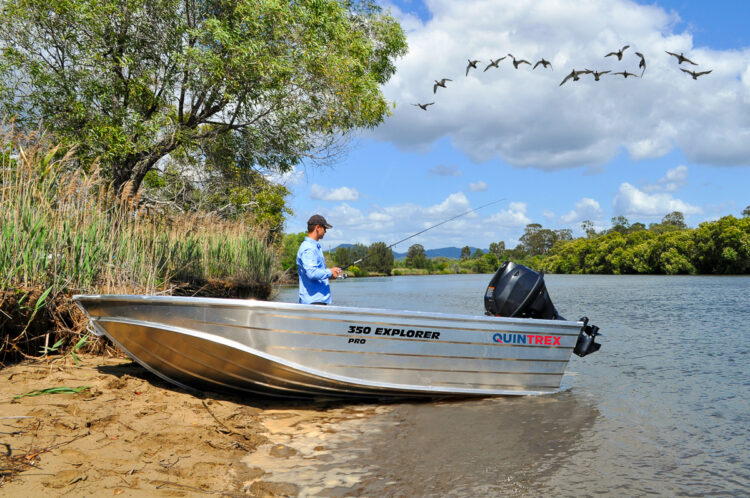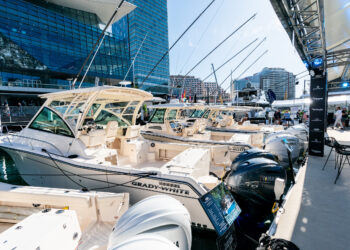SMALL aluminium boats are popular choice for many Aussie boaters. They’re an iconic Australian boat and they’re popular for so many reasons.
Let’s explore the benefits of owning a aluminium boat under 5-metres and discover what makes them so popular.
The small things
Small boats under 5-metres are a the perfect choice for a newcomer to boating.
Firstly, many new boaters are younger or, as a first boat buyer, are simply unwilling to part with a large sum of cash for a new pastime or hobby.
Boats in this small aluminium category are typically more affordable. They’re the perfect choice for “testing the waters”.
My first boat was a 3.9m Quintrex fitted with a 40hp two-stroke Yamaha. Buying that boat was a day I’ll never forget. I owned it for several years and eventually sold it to a colleague who still owns it and catches scores of fish in the estuaries and freshwater.
After that I upgraded to an American built Scout fibreglass centre console before trading that in for a Bar Crusher. I’m now on my second Bar Crusher. I also own a small fibreglass boat and several canoes and kayaks. Small boats are the stepping stone for a lifetime of boating.
They’re also a perfect step for the land based fisho to make the leap into boating without too much financial commitment.
I recall as a fishing crazed teenager buying a cheap $25 K Mart inflatable toy boat. My friends and I spent countless hours along the riverbanks fishing for local bass with moderate success. It wasn’t until we took these ultra-cheap and leaky inflatable boats beyond the shoreline did we see how productive fishing from a boat is compared to being stuck on shore. Even tasks such as unhooking lures form trees became easier.
Small sub 5-metre aluminium boats aren’t just for newcomers. There are multiple reasons serious fishos and boaties own small aluminium boats, regardless of budget or boating experience.
Let’s look at some advantages of these small boats.

Storage
Boat storage is becoming a genuine problem in our big cities. I live in the outer western suburbs of Sydney and have seen how much spare space is allocated to the new housing developments… almost none! Sadly, the great Australian dream of owning your own home doesn’t include a sizeable garage or accessible backyard anymore.
When I purchased a home a few years back, one of the essentials was access to the backyard for boats and a carport or garage large enough to store boats.
But not everyone is so lucky or have that sort of priority and the average boater has no choice but to buy a small boat that fits in with their lifestyle in the suburbs.
This is where the small boat excels. They can be manoeuvred and squeezed into smallest garage or nook at the side or front of a house.
Towing
Another big advantage is the ease of towing. It goes without saying, smaller boats are lighter and many of them are open.
These light boats can be towed by practically any car with a towball and usually weigh well under a tonne. There’s no need to for complicated electric brake systems in your car or expensive 4WDs or trucks designed for towing. Your average family car will work in most cases.
The lightness is also a bonus at home and at the ramp. Being able to manoeuvre the boat on the trailer at home when hooking up the boat is a real advantage. Likewise, when launching or retrieving your boat at the ramp, being able to handle it in the water and alongside the wharf is a always a simple task.
Again, this is one of the reasons these small boats are great for newcomers to boating.
No mates? No worries
Not everyone can find someone to share a day on the water at short notice. And many people enjoy solo boating. There’s something special about being out on the water alone.
These small boats under 5-metres lend themselves perfectly to solo boaters. As I said above, being lightweight, they’re easy to launch solo and no problem to handle solo once you’re on the water. Also, if you are fishing, the type of fish you catch in an estuary or freshwater river or lake doesn’t require a crew or multiple people to assist. You simply have a net nearby and when you hook a fish, you can fight and land it yourself.

Fishing
On the subject of fishing, let’s look at why these boats are so popular.
Some of the best fishos I know own and regularly use small aluminium boats, For some of them, budget is not an issue. They use these boats simply because they’re the most effective boat and they help catch the most fish.
One reason is they draw very little water and can be used to creep up on shallow sand flats or further up rivers or creeks where large boats dare not proceed.
Another reason is they’re easy to manoeuvre in the same places and most of them are open and that leaves plenty of space for casting.
They’re also quite tough and able to withstand rough treatment and still perform season after season.
When you’re done fishing or the day, small aluminium boats are also very easy to look after. Flush the motor and wash down the boats and trailer and it’s done until your next trip.
General boating
Even if your priority isn’t fishing, these boats make a good general purpose vessel for all of the above reasons.
My suggestion would be to look for one with a small cabin or, more commonly available, a windscreen. If you’re not doing too much fishing, these cabins or weather protection won’t impede on space. Companies such as Quintrex have popular models like the 481 Cruiseabout. This small bowrider configuration offers protection from the windscreen and plenty of space for relaxing and cruising around.
Tiller or steering wheel?
Many small open tinnies have a tiller steer rather than a console or helm area and a steering wheel.
So what’s better? Like anything in boating, one isn’t necessarily better than the other. It comes down to personal preference.
Personally, I’d opt for tiller steering in any boat under 4.2m. These are small boats and it’s best to maximise any available space. You also have good visibility in small boats and being positioned at the back controlling the tiller still allows you to see easily. As the boats get bigger, moving to a seated to standing position further forward behind a console or cabin helm makes more sense for visibility and control of the boat.

Boat designs
Not all boats are created equal. There are many different designs and configurations, even in small boats.
Let’s look at a couple of common designs. While every boat manufacturer has variations and their own take on trusted designs, the most common is a basic deep-v hull. This design is what you mostly encounter on the water and is basically a boat with a pointy nose and sharp deadrise at the bow, and a flatter deadrise at the rear. This is a great all-rounder for cutting through waves and still maintaining stability under way and at rest.
Another popular design is the v-nose punt design. Again, all boat companies have refined this over the years and many boats are unrecognisable ion design compared to 20 years ago. This design is more of a hybrid between a deep-v and a punt. The nose still cuts through the chop, but the flatter section of the hull moves forward on the boat and overall has a flatter “V” shape compared to the traditional hull shape. It’s designed more for river and protected lakes.
My advice is to talk to your local boat dealer about the best hull design for your purpose and look at what each manufacturer offers.
Outboards
Finally, let’s look at outboards. The great news is all outboards on the market these days are ideal. There are no bad brands that you should avoid. The main brands such as Yamaha, Mercury, Suzuki, Honda and Tohatsu are all ideal for small boats under 5-metres.
If you’re looking a very small boat, around 3m or less, it pays to look at what the outboard weighs and opt for the lightest possible.
Most outboards for boats under 5-metres are economical four-strokes and most would be under 90hp. In general, go for the maximum horsepower that’s suggested for your boat, and again, take the advice from your boat dealer one the best choice for your chosen hull.
Warranty is another factor that could steer your choice one way or the other.
There are also more an more choices in electric outboards and these are undoubtedly the way of future for small boats.
Conclusion
There are many reasons for owning a small boat. And while they’re affordable and great for beginners, they also make very effective fishing vessels and are the go-to choice for experienced fishos. They have many advantages over larger boats and that’s one of the reasons they will remain a popular choice for the Aussie fisho and boater.
Originally published in the Nautilus Marine Magazine.

















